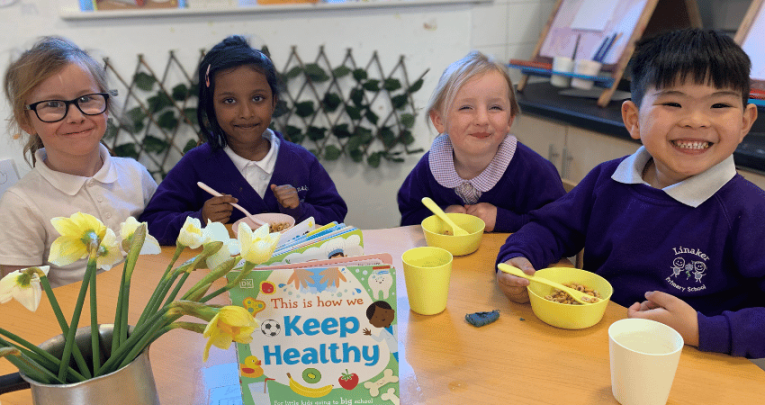Conversation cafe – Oracy intervention that kids love

Discover how stopping for a casual chat can teach pupils crucial skills without them even knowing it…

- by Sarah Wilcox
- Early Years lead at Linaker Primary, Southport

How our conversation cafe encourages our children to really communicate with one another, on their own terms…
We all know that the art of conversation is crucial for language and cognitive development in Early Years, as it forms the foundations for all future learning.
Linaker Primary School has a higher-than-average percentage of EAL students. This makes it crucial for us to promote an environment where we encourage children to tell stories, share ideas and question with curiosity and sensitivity. It’s particularly important in a world of increasing technology and seemingly less social interaction for our children.
So, we had to come up with an idea that wasn’t too heavy-handed or cumbersome, but that encouraged our children to really communicate with one another, on their own terms. We found that a conversation cafe is the perfect spot to do just that.
What is a conversation cafe?
Our conversation cafe is open during rolling snack time, and there is only one rule: to dine here you must hold a conversation with your friends.
We offer our conversation cafe during continuous provision time twice daily, serving healthy food such as cereal, fruit, cheese, crackers and vegetables.
There are clear rules for the conversation cafe, too: no lone diners and lots of chat. We encourage children to invite a friend or sit with a group for their snack. This often leads to both familiar and unfamiliar friendship groups sharing conversations.
Some children aren’t necessarily confident in sparking up a chat out of thin air, so at the conversation cafe we provide optional conversation prompts, sentence starters, images and props to ignite pupils’ connections with each other.
These often link to our current topic, our local environment, recent festivals and celebrations, or what the weather is like that day.
Our favourite prompt is an unopened box and a question mark, which is enough to spark predictions, reasoning and curiosity. Children love to discuss what could possibly be inside the box, and its size, suitability and relevance.
How to host a conversation cafe
We make sure that staff are at the conversation cafe to provide support through high-quality modelling. This encourages children to become comfortable using a rich range of vocabulary and language structures.
We’ve now noticed that pupils have started to lead the conversation cafe themselves. They’ll often even bring in things from home to talk about, blending the traditional ‘show and tell’ with chat and oracy development.
This places ownership of the conversation with the children. They often relish the opportunity to host the chat, comparing opinions, likes and dislikes with one another.
All this happens during snack time, with low stakes and an infinite ceiling of language, vocabulary and confidence-boosting chat; it’s a joy to see.
The opportunities for talk really are endless, but I would recommend that you have staff on hand to support oracy skills. This has been particularly useful with our EAL children. Staff can subtly model vocabulary, dialogue and listening skills, and help pupils whose first language isn’t English to feel more confident.
Most of the time children lead their own conversations with debate, opinion, empathy and understanding. However, staff join in here and there to challenge children’s opinions and encourage them to reason and justify their thoughts. They also nurture back-and-forth interactions, turn-taking, active listening and understanding non-verbal cues.
Easy intervention
Communication and language interventions are often laborious in nature and time. However, our conversation cafe is actually jam-packed with learning outcomes and oracy development without feeling like an intervention at all.
We have seen a significant increase in communication and language skills since we launched the conversation cafe. We’re really proud of our confident, chatty children.
Life in Reception is busy, and there is always something to do, but stopping for a chat might just be the most valuable tool in our teaching kits.
Sarah Wilcox is Early Years lead at Linaker Primary in Southport.










